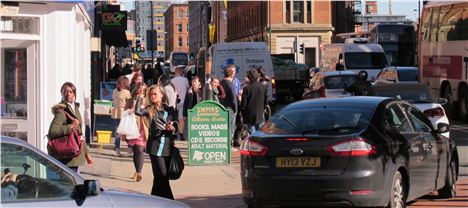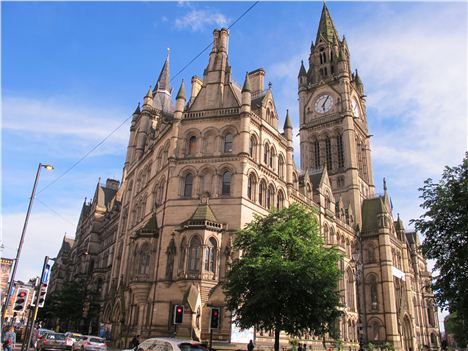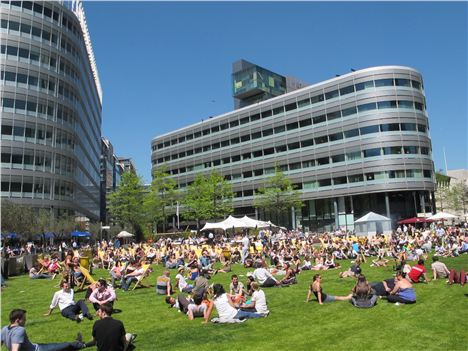THE CASE for more devolved power to the English cities and regions is gathering momentum.
The extra powers all main Westminster parties have promised to Holyrood should Scotland vote 'no' have let the cat out of the bag.
There's all the Scottish debate going on, the to-ing and fro-ing of 'Oh yes we can' and 'Oh no we can't' with queues of business leaders saying independence will be 'catastrophic' while mobs of yes-ers outside BBC Scotland wave their fists and moan about BBC bias.
Down here in Merry England the fuss over the border has led to chatter and gossip about devolution for the English regions and cities.
Of course Manchester is at the centre of much of this.
As the second city of national attention rather than the second city of population (Birmingham) we have become accustomed to it, but recent weeks have seen the voices getting louder.
Naturally Manchester
We've had the debate about HS3 as well as HS2 with George Osborne, Ed Miliband and Nick Clegg all competing to say something significant on how railways should up their game in the north of England with improvements centred on Manchester.
Glasgow has weighed in saying it has more in common with Northern English cities such as Manchester than it does with Inverness and Galashiels. Along with the English cities it thinks it should be given extra powers to reflect its regional significance.
Closer to home Sir Richard Leese, Leader of Manchester City Council underlined the point in June: "You only have to look at the success a city like Barcelona has achieved by being given freedom to make decisions based on local need and circumstance. Cities need to be given the powers to compete or we will fall behind.”
But why Manchester?
Well, it has to help that George Osborne, the Chancellor of the Exchequer, is a Tory MP in nearby Tatton and likes the city. It might even help that the city has successfully held political conference after political conference, and political bigwigs have experienced how things have changed.
More importantly, of course, Manchester's stewardship of its redevelopment (not without controversy), its airport and the strength of its higher education and business sectors at the centre of a substantial regional population underlines its readiness for greater self-governance.
Greater Manchester's ten authorities have also demonstrated a real commitment to work together as a Combined Authority which 'co-ordinates key economic development, regeneration and transport functions'. Petty jealousies seem to have lessened.
Manchester Town Hall
But as stated above we have to be grateful to the Scottish Referendum for driving this.
The extra powers all the main Westminster parties have promised to Holyrood should Scotland vote 'no' have let the cat out of the bag. The level of self-governance on offer would be inequitable in one region without some form of reciprocation in others.
After 18 September it's impossible for UK governments to turn back from the course of allowing 'decisions based on local need and circumstance', to quote Leese, to flow out across the country.
Happily for the English regions it'll be very hard to do so given party promises to Scotland in recent weeks even if the latter votes 'Yes'.
Now the very credible non-party aligned think tank ResPublica has joined in the debate, focussed on Manchester, and gone much further.
It thinks Manchester is the natural place to pioneer devo-max for British cities.
Hot summer Manchester
Here's the ResPublica press release:
'A radical plan enabling Greater Manchester to set its own income tax in five years and elect its own independent Mayor is proposed.
'ResPublica says Greater Manchester should be the first fully devolved City in England with full control over all the public spending in its area.
'In one of the most comprehensive reports to date (Res Republica's) Philip Blond says devolution can lead to economic growth. In short he wants Greater Manchester to have everything Scotland wants. And he says this should be the blueprint for other cities in England.
'The report Devo Max – Devo Manc: Place-based public services recommends:
'Total Manchester public spending should be brought under the control of GM Combined Authority, under a new governance structure and accountability.
'The Authority should be given legal powers to enact local joined-up Government, eliminating duplication and encouraging multi-agency initiatives.
'Government should begin by giving Manchester power over property taxes, and move on to local income taxes.
'Powers to reinvest savings and proceeds should be managed locally, while a percentage of overheads remains with Whitehall, the rest should be devolved.
'Create a new democratic system with an elected Assembly led by the Mayor of Manchester.
'For decades we’ve watched England’s cities sliding into decline. This is why England needs devolution. Financial freedom must come to Greater Manchester. Its population is bigger than Northern Ireland’s. Its economy is bigger than Wales. And it has a higher growth rate than Scotland. This is why it should be able to set its own taxes. It should have an elected Mayor. These plans outlined in today’s report, will allow it to turn its fortunes around, lifting the population out of the doldrums. This is a blueprint for independence for cities in England.
Supporting the report Lord Peter Smith, Chair of the Greater Manchester Combined Authority, said:
“We welcome the broad thrust of this independent analysis which makes a case for total devolution to city regions on a scale that recognises the game-changing potential to both reduce public spending and boost growth. This full devolution model echoes our ambition, and we welcome ResPublica’s view that Greater Manchester would be uniquely placed to pioneer it.”
Dawn over the city
During its 1800s heyday Manchester was virtually a city-state and saw itself that way. By 1900, it controlled all aspects of governance; education, police, gas, water, transport, parks and much else.
Of course even with the new mood we can't expect a return to that expansionist moment but a step backwards in that direction should certainly mean a leap forwards in efficient governance and a fairer society with 'decisions based on local need and circumstance'.
It should also lead to greater civic identity, to a boost in pride. Westminister needs to let go. Scotland looks set to ensure it does.
Maybe ResPublica's devo-max solution might cut too deep for politicians but certainly greater power is heading up the M6 soon.
We just have to wait and see how much.
You can follow Jonathan Schofield on Twitter @JonathSchofield or connect via Google+
Manchester Day celebrations














